#eureka: investigative urban fantasy
Note
Wait does Eureka have its own established lore for how different supernatural creatures work?
Yes, it does!

(I’m going to preface this post by saying that just about everything I’m talking about here, and more, is available FOR FREE for you to read in the free pre-release version of the Eureka: Investigative Urban Fantasy rulebook that you can download from our website. Go to Chapter 8 to start reading about the supernatural lore. The rulebook itself will do a lot better job of explaining all this than I will, because it has the exact details of how each one works, and I’m just hitting the highlights and going over what those details mean.)
Eureka: Investigative Urban Fantasy is a game about very human and believable investigators digging into dangerous (often supernatural) mysteries way over their heads, and sometimes those very human and believable investigators will be supernatural creatures themselves.
These supernatural creatures are every bit as human and “normal” as their mundane investigators counterparts, they have jobs, friends, families, hobbies, etc. They live among mundane society, not outside of it.
Most modern fantasy settings have some kind of separation between normal society and magical society, like you see in Harry Potter where there is normal society, and then a separate, secret magical society hidden away from it, or Vampire: The Masquerade, where vampires all have an agreement to keep themselves a secret from normal society despite acting within it.
In Eureka’s world, there is no “masquerade,” but that doesn’t mean that magic and monsters are well-known and well-documented phenomenons. Supernatural creatures such as vampires, wolfmen, etc. are exceptionally rare. Don’t take this as an exact number, but you can probably assume there’s about one of these per every 3.3 million normal people.
This rarity, as well as the fact that each individual has little to gain and everything to lose by revealing themselves (try “coming out” as a person who regularly assaults people and drains their blood), has led to them going largely undocumented in the modern day. Sure, this is the digital age, there are videos, but viral videos are not exactly scientific evidence. For every real vampire caught on camera, there are a thousand hoaxes and horror short films.
There is no secret vampire government controlling things from the shadows—most vampires don’t even know any other vampires, let alone enough to form a secret society with any effect on national politics.
As for how they work, well, that’s one of my favorite parts to talk about.
There are five playable monster types in Eureka (The Vampire, The Wolfman, The Fairy, The Witch, and The Thing From Beyond) plus two extras that are Kickstarter stretch goals (The Dullahan and The Gorgon), but in the interest of time, I’m only going to really go into detail with one of them.
Most playable monster types in Eureka are very, very old-school, with an emphasis on actual historical folklore over just making up all our own lore. That doesn’t mean Eureka doesn’t have a unique approach to the supernatural, though. Little of it is “new,” but it is certainly unique, because to my knowledge no other RPG has ever taken the old stuff this far before. A PC being a monster in Eureka isn’t just a few +1s here and there and maybe a little extra damage from silver weapons, it means playing by an entirely different set of rules from fellow investigators.
The vampires and vampire lore you see in movies are not folkloric vampires, they are mostly a 20th and 21st century pop-culture creation. Eureka’s vampire abilities, weaknesses, and other traits are based on pre-1900 vampire legends, with older traits usually taking precedent over newer ones. Thus, a lot of assumptions you might have about vampires going in could end up being very wrong. For instance, in movies, vampires instantly die when exposed to sunlight, but the first ever instance of a vampire in a story being killed by sunlight was in the 1922 film Nosferatu. In Eureka, sunlight is still awful for vampires, it strips them of their vampiric powers, but it doesn’t do any real damage to them. Sunlight is an issue vampires have to deal with, but it is far from instant death. That doesn’t mean being a vampire is inherently easy though, because in addition to having all the powers that folkloric vampires have (which is a TON), they also have all the weaknesses, and it is the emphasis on weaknesses that really makes the moment-to-moment playing of a monster PC in Eureka the most interesting. A few of my favorites for vampires are the refusal to enter homes without a direct invitation, and the compulsion to count large numbers of small objects. I think most vampire media these days considers these to be “silly” weaknesses and don’t want to acknowledge them in the lore of their “serious” scary horror vampires, but honestly I think that the “sillier” vampire stuff can still be used to great effect in horror. Imagine knowing that the only reason a vicious killer at your door hasn’t stormed in to rip your throat out is because they’re being polite.
A vampiric investigator will need to work around these weaknesses, and more, in their daily life, all while being sure not to reveal their true nature to their more mortal friends. It’s something that really changes how a character behaves and goes about problem-solving.
For instance, the rest of the party may be able to break into a house no-problem, but the vampire cannot. They need a invitation. That’s a problem. That’s a puzzle. It makes me excited just thinking about it.
This was originally going to be a much longer post where I went into more of the themes of monsters in Eureka, but I have decided that that would be most cohesive as its own post, an upcoming essay titled "How Eureka Handles Disability." So stay tuned for that.
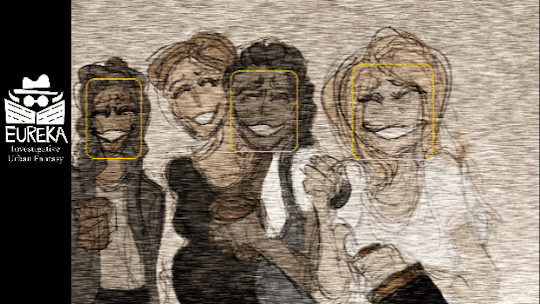
Eureka: Investigative Urban Fantasy is kickstarting from right now until May 10th! Back it while you still can!
youtube
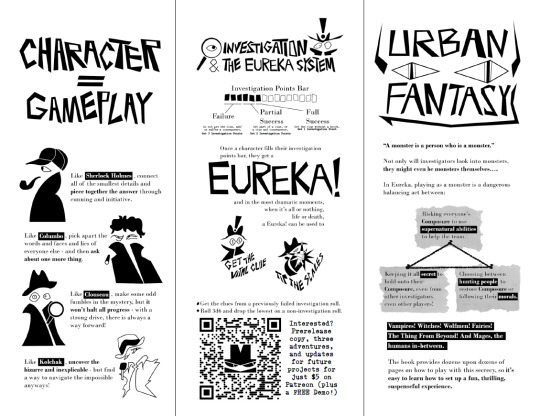
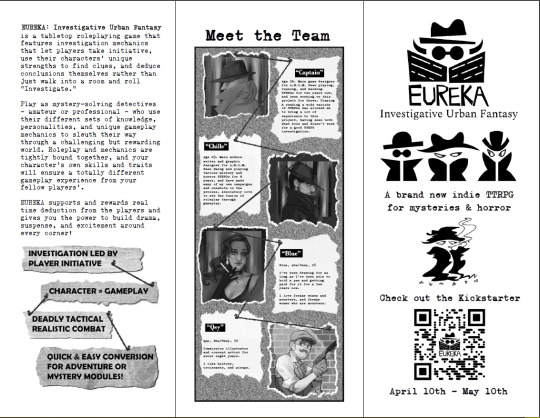
If you want to try before you buy, you can download a free demo of the prerelease version from our website or our itch.io page!
If you’re interested in a more updated and improved version of Eureka: Investigative Urban Fantasy than the free demo you got from our website, subscribe to our Patreon where we frequently roll our new updates for the prerelease version!
You can also support us on Ko-fi, or by checking out our merchandise!
Join our TTRPG Book Club At the time of writng this, Eureka: Investigative Urban Fantasy is the current game being played in the book club, and anyone who wants to participate in discussion, but can’t afford to make a contribution, will be given the most updated prerelease version for free! Plus it’s just a great place to discuss and play new TTRPGs you might not be able to otherwise!
We hope to see you there, and that you will help our dreams come true and launch our careers as indie TTRPG developers with a bang by getting us to our base goal and blowing those stretch goals out of the water, and fight back against WotC's monopoly on the entire hobby. Wish us luck.

#eureka: investigative urban fantasy#ttrpg#rpg#roleplaying#eureka#monsters#tabletop#coc#vampires#vampire the requiem#vampire#vampire core#vampiric#vampire art#vampire girl#vampirism#vampiress#ttrpg art#ttrpg community#ttrpg tumblr#indie ttrpg#ttrpg character#dungeons and dragons#roleplaying games#pathfinder#werewolf#werewolves#lycan#shapeshifter#lycanthropy
39 notes
·
View notes
Text
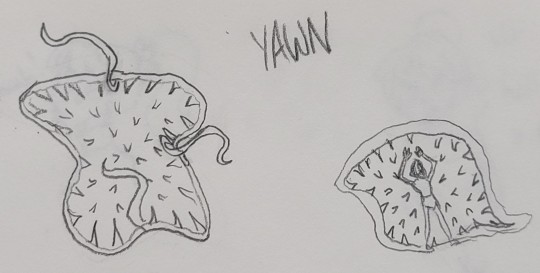
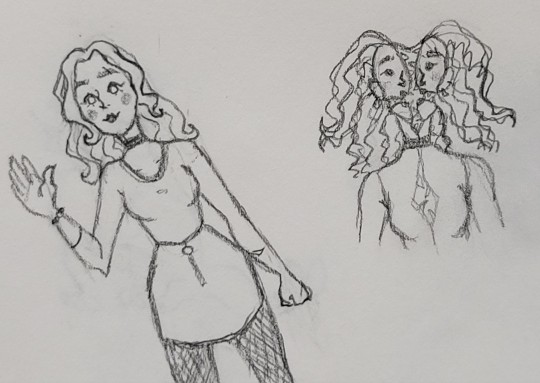
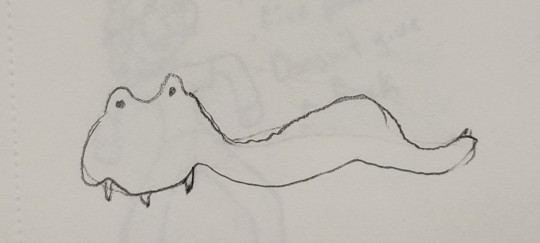
My friends are making a ttrpg where you can play as monster mystery investigators. Needless to say I've been having a blast designing monster girls! This cute little murder blanket here is the Thing From Beyond, an alien shafeshifter with very particular dietary restrictions. (It's people!!) It's just one of the several playable monsters that Eureka has to offer. The TFB is quite special as it's a Eureka exclusive creation and based heavily off of great movie monsters like The Thing, The Blob, and many more!
#eureka: investigative urban fantasy#eureka#rpg#monsters#coc#allied forces#roleplaying#tabletop#ttrpg#monster girls#ttrpgs#ttrpg art#indie ttrpg#ttrpg community#indie#indie games#fantasy#doodles#oc
113 notes
·
View notes
Text
Right now, I am running a Eureka: Investigative Urban Fantasy game in @anim-ttrpgs RPG book club. Coming into this, I was unsure about the Wealth mechanic and the requirement of having scenes for characters eating. Of course I understood what it was evoking (the intrepid investigators meet up at the diner to discuss the next step!) but I was unsure how it would play out at the table.
I warmed up very quickly to it. In fact, the best moments of character interaction have consistently come from meal scenes - they've been the most memorable parts of the game! In the very first session, one PC, a Catholic nun, ended up buying some breakfast bars for another extremely poor investigator, which gave the characters a relationship to build off.
The scenes only got more memorable from that point on, in particular that same nun learning the true nature of one of the party members over breakfast at a diner. I suppose learning your partner in crime is a real vampire will do that!
#a.n.i.m.#ttrpg#ttrpg tumblr#ttrpg recommendations#book club#eureka: investigative urban fantasy#eureka
79 notes
·
View notes
Text
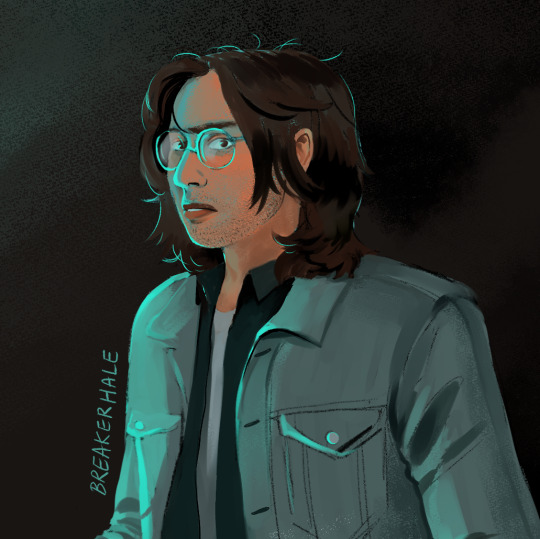

Toby (they/them) enjoys a quiet life in their small town, putting to use their enthusiasm for nitpicking and obscure nature facts as an editor for the "Regional Geographic", an esoteric publication that Toby insists is well-regarded among its small readership. They have a bit of a nervous smoking habit, but it's only really a problem on the days following a particularly bloody night of poking around the neighborhood "demon-cursed" house...
[I made Toby to play a TTRPG that's currently being Kickstarted, called Eureka: Investigative Urban Fantasy, created by the folks over at @anim-ttrpgs !]
16 notes
·
View notes
Photo

Eureka: Investigative Urban Fantasy is a neo-noir investigation-focused RPG with (as you can probably guess from the title) a supernatural twist. Eureka fills several voids we have noticed in the TTRPG space. Eureka supports investigation to a degree we haven’t seen before, ensuring that searching for clues is a granular and player-driven process, but also ensuring that the whole story doesn’t grind to a halt after one single failed investigation check.
Though most PCs will be mundane humans—or perhaps because most PCs will be mundane humans—Eureka also supports playing monstrous PCs, such as a vampire, in a way we have never seen before. This isn’t just a watered-down stat bonus, it’s like playing an almost entirely different game, with all the monster’s strengths and weaknesses to account for while solving the mystery, plus the added incentive to keep it a secret from the other PCs as well as their players.
If you like or are interested in Call of Cthulhu, Monster of the Week, Dresden Files, X-Files, Kolchak: The Night Stalker, Apocalypse Keys, or Gumshoe, you’ll probably find something in Eureka to really enjoy.
Eureka: Investigative Urban Fantasy is launching on Kickstarter on April 10th, 2024! Here's a link to the Kickstarter page.
You can find out more on the blog @anim-ttrpgs and download a free demo from the link on our website or on the itch.io page.
114 notes
·
View notes
Text
Have you played EUREKA : Investigative Urban Fantasy ?
By A.N.I.M

Eureka: Investigative Urban Fantasy is a neo-noir investigation-focused RPG with (as you can probably guess from the title) a supernatural twist. Eureka fills several voids we have noticed in the TTRPG space. Eureka supports investigation to a degree we haven’t seen before, ensuring that searching for clues is a granular and player-driven process, but also ensuring that the whole story doesn’t grind to a halt after one single failed investigation check.
Though most PCs will be mundane humans—or perhaps because most PCs will be mundane humans—Eureka also supports playing monstrous PCs, such as a vampire, in a way we have never seen before. This isn’t just a watered-down stat bonus, it’s like playing an almost entirely different game, with all the monster’s strengths and weaknesses to account for while solving the mystery, plus the added incentive to keep it a secret from the other PCs as well as their players.
If you like or are interested in Call of Cthulhu, Monster of the Week, Dresden Files, X-Files, Kolchak: The Night Stalker, Apocalypse Keys, or Gumshoe, you’ll probably find something in Eureka to really enjoy.
Currently being crowdfunded on Kickstarter
92 notes
·
View notes
Text
Review Two, Electric Boogaloo: Eureka: Investigative Urban Fantasy
This is my second review for Eureka, as the document has been majorly updated, and the designers are gearing up to fund it on Kickstarter from April 10 to May 10.

This game is an investigative game meant for mysteries that incorporate a large amount of action and horror. I’m going to break down some of the interesting things Eureka does, and talk about who I think would be a good audience for it.
Graded Success
Eureka uses 2d6 for pretty much every roll, with the possibility of ending up with a failure, a partial success, or a full success. You can add modifiers from various different places, such as your skills, your fear, and your player Truth. The breadth of this game and the game philosophy behind it means that it is not a Powered by the Apocalypse style game - Eureka is its own beast.
Investigation
There are two kinds of rolls in Eureka - investigative and non-investigative. When you are not investigating, success and failure will mostly be determined by what makes sense in the fiction. For investigative rolls, regardless of success or failure, your character will receive investigation points.
I really like this mechanic because even if you fail, your character makes progress - and in fact, since you gain more investigation points when you fail, this plays as if your character is able to use their failures to arrive at a conclusion later in the story.
This is a great time to talk about the Investigation Bar, which is the central focus of the game. When you fill the Investigation Bar, you get a Eureka! This could be a chance to get a vital piece of information, or to tip the narrative scales into your character’s favor.
Precious Information - Secretive Play
Secrets are important in Eureka. The Narrator has secrets of course - the answers to the mystery, the motives of the NPCs, the supernatural that is hiding around the corner - but the players do to. If you are a vampire, a werewolf, a psychic, etc., you are encouraged to wait until a dramatically appropriate moment in the game to reveal this information.
This presents a very specific style of play. Eureka is an ideal game for folks who want to procedurally uncover information, and game masters who like using pre-determined, pre-written mysteries, with motives, clues and events mapped out. How these mysteries are solved still depends on what happens in play, but as a GM, you’ll have plenty of sources to draw on when the characters ask questions.
Eureka also prepares players for messy relationships between their characters. If you want your characters to misunderstand each-other, compete with each-other, or even betray each-other, that is an option in this game. These complicated relationships might even give birth to a secondary plot line for the characters to follow as they try to solve the mystery, especially if they want to find the answers for different reasons. I think it has the potential to make Eureka a multi-layered storytelling experience.
Procedurals
This multi-layered experience is possible only if you have one or more members of the group who are dedicated to taking notes. Because the information being relayed to the characters is so important, it’s crucial that the players remember that information.
In some ways, this reminds me of games where players are expected to get inventive with the tools they have. Players are given pieces of information, and then asked to put the pieces together while in character. The handing out of this information is similar to what I’ve heard described in GUMSHOE - obvious clues will not require a roll - but what is done with that information is up to the players.
I think this might be why playing in longer games or campaigns might be a really good format for Eureka, because it allows characters to piece together a big mystery over a long period of time. This is a game that requires a large amount of investment from both players and game-master alike; this is procedural play in which the narrative emerges from the procedure.
Horror
Eureka thrives with horror, and while the game is meant to be compatible with adventures with various systems, that doesn’t mean that it is genre-agnostic. There are dark things in the corners of this world, whatever it may be, and those things will scare and stress out your characters. There are a number of mechanics that tie Eureka to horror really well.
First is Composure, which is a replacement for sanity mechanics of games like Call of Cthulhu. Your character can only take so much emotional stress before it starts to inhibit their ability to perform certain tasks. If you lose enough Composure, you’ll find yourself hindered in the amount of positive modifiers you can apply to any given action. I like how this replicates how stressors can inhibit it personal performance - and the fact that Composure can be regained means that you can moderate how gruelling the gameplay is.
There’s also character Truths, which aren’t necessarily horrific, but can give you a reason to take the less-than-optimal path in any given situation. Similar to Vice in World of Darkness, you can gain a modifier to a situation in which your character chooses to act in a way that is in line with their Truth, even if there is another option available. This is a mechanical reward for playing true to your character, flaws and all.
The game also asks you to personalize the fears associated with your character. These fears may trigger Composure Rolls, or apply modifiers to them to make them harder to pass. These fears may also be cues to give to your Narrator, indicating what kinds of things you want to inhibit your character, and what kinds of things you want your character to be able to face with little difficulty.
Toolbox
There are elements of Eureka that are optional, which are there to help tailor your game experience. For example, you can include a Ticking Clock to give your players a dead-line or heighten the suspense, which can focus the game and also make it feel more like a thriller.
You can also tailor the skills to make the game fit a certain setting, such as prioritizing horseback riding or driving cars - or perhaps increasing the medical skills to make this a mystery much more focused on biology and medical practises.
The game also has many nods to various forms of detective fiction, as well as supernatural mysteries, action pulp films, and film noir. You can see this primarily in character abilities, which come as a big list of things you can pick and choose and pair together for a unique character.
All in all, if you want a game where Columbo, Buffy the Vampire Slayer, and Indiana Jones can all be in the same adventuring party, you might want to check out Eureka.
You can find a free download version of Eureka here, and keep an eye out for the Kickstarter here!
50 notes
·
View notes
Text
youtube
The Eureka trailer is so cool oh cool they have a kicked starter too
30 notes
·
View notes
Text
I am so excited to bring you news about Eureka: Investigative Urban Fantasy, the TTRPG I have co-written, within the next few weeks or months.
83 notes
·
View notes
Note
Would you be interested in covering Eureka: Investigative Urban Fantasy?
Yeah, just looked it up and it looks really fun! Like I say to everybody who sends their ttrpgs my way, I can't make promises that I'll make content on it, but I am always willing to give it a look and a read and this one looks great so I could definitely see myself covering it! :)
7 notes
·
View notes
Text
The Kickstarter for Eureka: Investigative Urban Fantasy is Live!!
Eureka: Investigative Urban Fantasy is our team’s debut TTRPG, over three years in the making! The campaign will run from April 10th to May 10th!
youtube
How far would you go to learn the truth?
Play amateur detectives caught up in things they barely understand, and explore how the lives of your characters unravel as they push themselves to dig deeper into the unknown!

Tense investigations!
Delve into an investigation-focused mystery and horror system that lets players take initiative and use their characters’ unique strengths to find clues and deduce conclusions themselves. A few bad rolls won’t get the party hopelessly stuck, but at the same time Eureka respects their intellect and lets them take charge of solving the mystery!

Character-driven gameplay!
Stats and abilities are based on who your character is as a person. Freeform character creation allows you to build a totally unique little guy, and have a totally unique gameplay experience with him! This is supported by the backbone of the Composure mechanic. Stress, fear, fatigue, and hunger will wear your investigators down as they trudge deeper into the unknown. Food, sleep, and connections with their fellow investigators are the only way to keep them going!

Secrets inside and out!
Any investigator could be a monster, helping their friends while trying not to reveal their true natures. The party will learn to trust and rely on each other, or explode into a tangled net of drama!
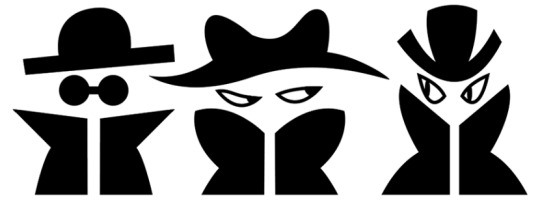
Intense, tactical combat!
Hits are devastating, and misses are unpredictable–firing a gun will always change the situation somehow, for better or for worse!

Now in Technicolor!
Evocative artwork from talented femme-fatales @chaospyromancy and @qsycomplainsalot and the mysterious @theblackwarden paint a gorgeously-realized portrait of a world with shadows lurking in every corner.
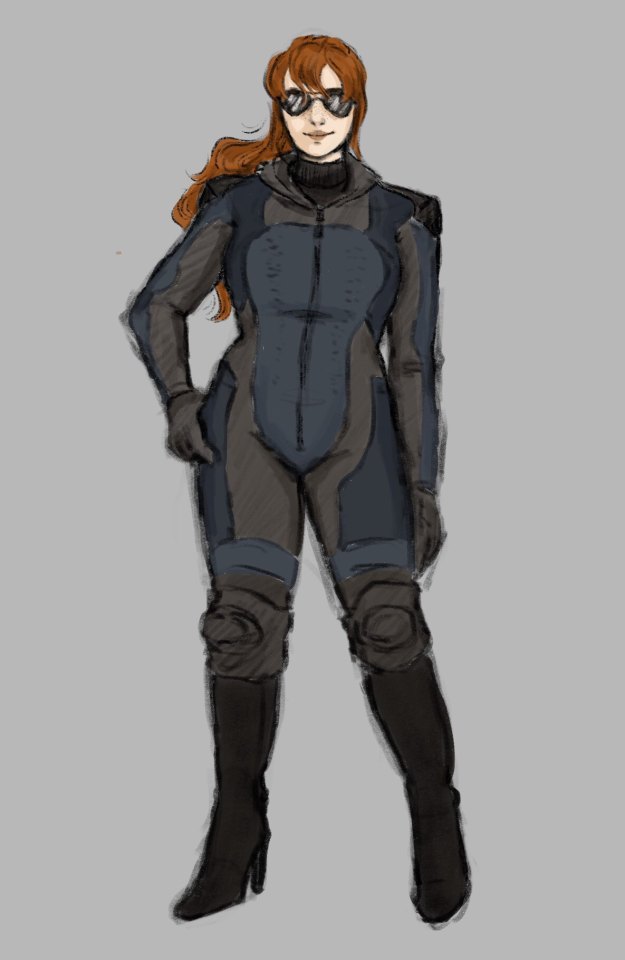

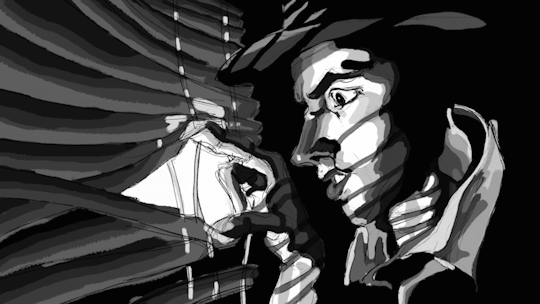
Elegantly designed and thoroughly playtested, Eureka represents the culmination of three years of near-daily work from our team, as well as a lot of our own money. We are almost at the end, we just need some financial support to put the finishing touches on it and make the final push to get it ready for official release!
With every stretch goal we meet, the game gets better and better. Tons of beautiful new artwork, new options for gameplay, and even two entirely new playable Monsters could be added to the book, so visit the Kickstarter and secure your copy today!
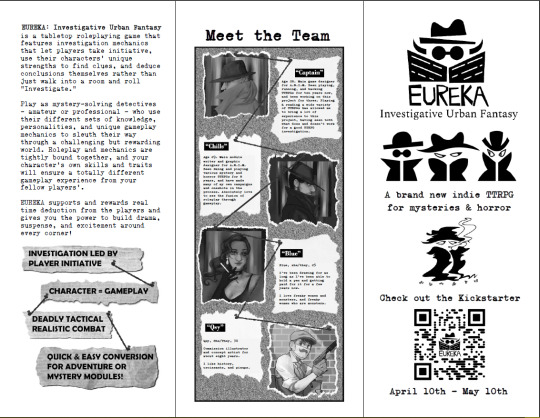

If you want to try before you buy, you can download a free demo of the prerelease version from our website or our itch.io page!
If you’re interested in a more updated and improved version of Eureka: Investigative Urban Fantasy than the free demo you got from our website, subscribe to our Patreon where we frequently roll our new updates for the prerelease version!
You can also support us on Ko-fi, or by checking out our merchandise!
Join our TTRPG Book Club At the time of writng this, Eureka: Investigative Urban Fantasy is the current game being played in the book club, and anyone who wants to participate in discussion, but can’t afford to make a contribution, will be given the most updated prerelease version for free! Plus it’s just a great place to discuss and play new TTRPGs you might not be able to otherwise!
We hope to see you there, and that you will help our dreams come true and launch our careers as indie TTRPG developers with a bang by getting us to our base goal and blowing those stretch goals out of the water, and fight back against WotC's monopoly on the entire hobby. Wish us luck.

#eureka: investigative urban fantasy#ttrpg#rpg#roleplaying#tabletop#eureka#coc#monsters#indie designer#indie#indie games#indiegames#indie game#ttrpg design#ttrpg tumblr#ttrpg art#indie ttrpg#ttrpg community#ttrpgs#free rpg#fantasy rpg#rpgs#supernatural rpg#tabletop roleplaying#roleplay#critical role#roleplaying games#tabletop role playing game#friends at the table#tiny table
327 notes
·
View notes
Text


Makeup test as Eureka's own Thing From Beyond! The TFB is a playable shapeshifting monster investigator who folds herself into a humanoid disguise to hide her true alien nature! Oh also she's a very picky eater with a taste for sapience. Despite her monstrous nature she just wants to be a real girl n.n
You can learn more about the TFB and other playable monster on my friends' indie ttrpg kickstarter!
#eureka#eureka: investigative urban fantasy#makeup#monster girl#monster makeup#ttrpg#tabletop#indie ttrpg#rpg#indie games#fantasy#horror
54 notes
·
View notes
Text
Daily RPG Readings
Eureka: Investigative Urban Fantasy, Part 2
Alright, for day two we'll be going over pages 28-39, ending at the heading "Role of the Narrator." This is less than what I wanted to cover each day, but I think its warranted for this section because the next 11 pages are extremely dense, and I have a lot to say about them.
We start off strong, with "Rolls, Investigation, & the Eureka! System." First there's a quick definition of what separates an investigation roll from a non-investigation roll, which is crucial because only investigation rolls grant investigation points and thus contribute to earning a Eureka! (the player resource, not to be confused with the game system itself). I feel this distinction warrants its own section in my overview, as earning Eureka! Points and gathering information is so crucial to the system functioning properly. This distinction could probably stand to be bolded with the next few paragraphs, in my opinion.
Without having seen it in play, I'm cautiously optimistic having investigation rolls be distinct from non-investigation rolls and linking the core momentum mechanic to only investigation rolls. I can see the logic in it - the game wants to be about mystery solving and gathering information, so it rewards that kind of gameplay more heavily. On the other hand, there is a slight risk of action-heavy sequences starving PCs of resources and throwing off the pacing of a longer game. I think it will work out, but I'm very interested to see how it actually works at the table.
Next, a conveniently bolded section covers the core gameplay loop of Eureka, and is noted to be extremely vital for all players to understand. To summarize: the Narrator (GM) describes a location in detail along with any points of interest, investigators see major details without needing to roll (but may need to poke around to find hidden details), and investigation rolls are made about specific clues or points-of-interest when the PCs interact with them in a meaningful way.
That's a reductive description, but I have more to say about it than I really want to outline here (seriously I could write essays about perception and information management in RPGs). I'll stick to the basics: I really, really like that PCs explicitly don't need to roll to notice obvious information. I'm hooting and hollering that we explicitly don't need rolls to get obvious or basic information about specific points of interest. I'm jumping out of my chair and yelling the name of my favorite sports team about the game pointing out that multiple different skills may be used to learn different things about a given point of interest, depending on interpretation.
Anyway this philosophy of information reminds me of GUMSHOE except more explicit about putting the things I like into rules text. I would perhaps like a note that red herrings should be sparing, because players rarely need help coming to wild conclusions based on spotty evidence, but this is a matter of opinion.
Now we learn about the results of an investigation roll at each degree of success, including how many investigation points (abbreviated IP going forward for brevity) are earned towards a Eureka! Point. A Full Success gets a lot of information and 1 IP. A Partial Success grants less information (or a consequence) and 2 IP. A Failure grants no information, but does give a generous 3 IP. We are also told to write down Failures on the character sheet for future use. Once an investigator gains 15 IP, they gain a Eureka! Point, the Eureka systems main reward for PCs and a potent resource. Eureka! Points can be spent to gain information from a previously failed investigation roll OR they can contribute extra odds of success to a non-investigation roll.
I always think granting resources for roll failure is a good idea, because it encourages players to think of 'bad' rolls as potentially exciting paths for the narrative to take rather than as 'losing the game' Since Eureka! Points are such a potent resource, it gives players something to look forward to no matter what the outcome of a roll is. I also love the incorporation of the mystery trope where a previously mysterious clue turns out to be a key piece of information later, once the characters put it into its appropriate context or think about it more deeply. Also, writing down Failed rolls encourages players to dip their toes into note taking and gets them into the habit of ruminating over previously acquired information, which is great for a mystery game.
I think Character moments granting IP and Eureka! adding odds of success to a non-investigation roll are great utilities too, but this section is getting away from me so I'm going to leave it there for now.
Lastly, we have an Example of Play for investigation, which is always an extremely helpful tool for players to be able to see the rules in action. In the scenario, two 1930s detectives are following the trail of a gang of bank robbers and have found one of the suspect's place of employment. We start off with a failed Charm roll that grants 3 IP, demonstrating that Interpersonal skills can be used for investigation just like any other, as long as its in the service of gaining information. The Narrator describes the immediate area, and one of the PCs notes a lack of points of interest (footprints) without needing to roll. The Narrator does not highlight this until the player asks about it, which encourages players to be smart, ask questions, and poke around.
Without giving a play-by-play, we get more investigation rolls demonstrating the various degrees of success for investigation rolls and how they move the narrative along. A Eureka! Point turns the first failed Charm roll into a success, resulting in a climactic moment where hidden compartment underneath a desk is revealed. The PC pushes the desk aside, and there is a note here that even if someone might have difficulty moving this desk in the real world, it is an inappropriate time to call for a roll because failure does not have stakes and would not be interesting (I'm hooting, hollering). Finally, the scene culminates in the beginning of combat as one of the NPCs attempts to stop the investigators in their tracks!
I think the example of play given serves its utility well and shows off the strengths of the sytems. No notes (yet, I might refer back to this later).
34 notes
·
View notes
Text

Stellar Eclipse Series
Urban Fantasy/Mystery/Drama
The Stellar Eclipse series tells the story of former murder investigators Baltan and Eureka and the two young men in their care, Azzie and Lleuwellyn, as they struggle to reconcile past trauma with their current lives. The first book, Cloudless Rain, follows Baltan and Eureka's attempts to thwart a serial murderer who has targeted Azzie and Lleuwellyn. The second book, Dark Lightning, follows the family into the wilderness as they set out to help save Eureka's former village, Kwoltan Gera, from destruction. The third (as-of-yet unreleased) book, Echoed Thunder, will see the investigators track down Azzie's mother and unearth secrets about Lleuwellyn's family that none would have expected.
CONTENT WARNINGS (Cloudless Rain): Abuse, Adult Situations, Anxiety, Child Abuse, Cults, Death, General Disturbing Content, Gore, Murder, Torture/Violence
CONTENT WARNINGS (Dark Lightning): Abuse, Child Abuse, Death, Trauma, Violence; Mentions of Past Abuse and Self-Harm
Read the Preview
Amazon | Barnes & Noble | Etsy
Reviews Say:
"It's been a long time since I've read a book this quickly. I devoured it."
- C. Dicocco
"Avalon writes compelling, heartwarming and unique characters. ... I found myself rooting for ALL of them. ... It's rare for me to be so attached to so many characters, but in this case, I loved them all." - Elayna Barrison
"... [A] phenomenal read that combines fantasy and mystery for a wild, gripping read you won’t want to put down. ... Roselin has put a great deal of effort into worldbuilding in this story, and it shows. If you’re looking for a fast-paced, entertaining read with compelling characters and a rich, descriptive setting, check out this book." - Briana Morgan
Listen to the Playlist | Watch the Trailer | Pinterest Board
#writeblr#bookblr#books#urban fantasy#mystery#drama#found family#indie author#indie fantasy#indie books#official book post#published writeblr#writeblr library
15 notes
·
View notes
Note
🌱
This is maybe cheating a little cause I've been involved with it on the playtesting for a while, but I'm very excited for Eureka: Investigative Urban Fantasy by @anim-ttrpgs ! It's got a funding campaign coming soon, and its been a blast to playtest it. The rules are both easy-to-understand and have a lot of depth, and it does some really unique things to keep that mystery vibe during play. Definitely one to keep an eye on if you ask me.
11 notes
·
View notes
Text
Mint Reviews: Eureka Investigative Urban Fantasy, by @anim-ttrpgs
The following is a review for Eureka: Investigative Urban Fantasy, a game currently in playtesting, set to be put up onto Kickstarter later this year. I received the playtest copy of the game in exchange for this review.
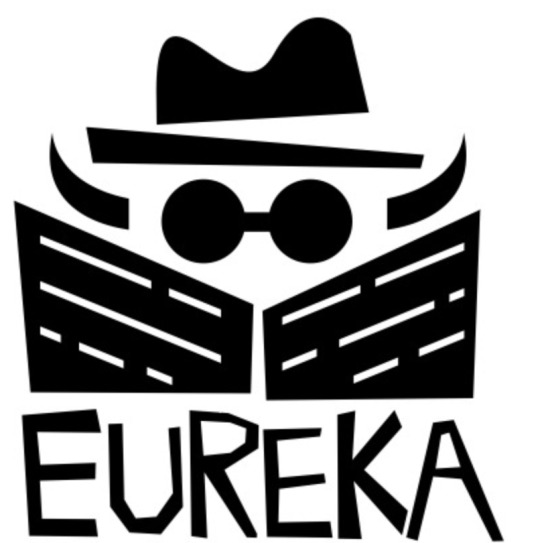
Eureka is a game about solving mysteries in an urban fantasy setting. It's meant to be dangerous and constantly keeping you guessing. The copy that I reviewed is a playtest copy, which is important to keep in mind for two reasons. One, because I was reviewing it before it's been subjected to proper layout, and addition of art. Two, because there may be changes to the game that alter the play experience that I would be expecting from this initial read-through. I certainly expect the authors to change or include new things before releasing the final version.
The mechanics of Eureka centre on rolling 2d6 and adding a modifier somewhere between -3 and +3. Your result will be one of three options: a Full Success, a Partial Success, or a Failure. Characters are made up of composite parts: you will have traits that give your character modifiers or special abilities, as well as two different health tracks, an Investigation Points Track, character morale/composure, and a list of gear.
Some of the central mechanics outside of the graded success of action roles involve Character Truths and the Investigation Track. Character Truths are personality quirks that tell you something core to your investigator, and reward role-play that is true to the character even if strategically it's a bad option.
As your characters look for clues, they will collect Investigation points every time they uncover a clue or fail a roll. Once they fill their Investigation track, they get something called a Eureka - a resource that gives the player the chance to tilt the narrative in their favour.
Damage in this game is layered: your characters have Superficial HP, and Penetrative HP. These tracks work interdependently of each-other, with Superficial HP bleeding into Penetrative HP if it fills up first. If you are familiar with the bashing damage and lethal damage of World of Darkness games, this system should be very familiar.
Stars:
The setting is very interesting and flexible, which means that if your group is very interested in urban fantasy, but you don't want to learn all of the big systems out there, Eureka is an option that only requires you to learn one system.
The game is designed to elevate suspense; the GM and the players are encouraged to keep secrets from each-other, and combat is often lethal.
The Woo Roll: a mechanic in gun combat that gives your characters some interesting moments when shooting a gun: after all, bullets don't just hit people, they also hit leaking pipes, fire extinguishers, innocent bystanders....
Wishes:
This game has a lot of rules (which is not necessarily a bad thing). There are three chapters dedicated to different kinds of combat and 2-3 chapters that need to be read to understand how characters work. As a result, however, I wish there was an index, to make finding pieces of information easier.
I wish there were more safety tools available in this game. I'm in the camp of preferring safety tools regardless of table or genre, but especially in horror games and games with suspense, there are elements of Eureka that could very easily trouble players who don't know what they've signed up for. The game encourages players to keep secrets from each-other, and prompts the GM to surprise the players with the kinds of horror that could be just around the corner. This isn't to say that a horror game shouldn't have some kind of surprise involved, but having a detailed Session 0 to talk about what is or is not on the table for everyone involved, as well as a method to signal that something in game is crossing Lines, would go so far here.
There are recommendations about what the characters should avoid playing (cops, FBI agents, etc.), but I found very little guidance about what kinds of characters should consider. I'd have loved to see some pre-generated suggestions for reasons as to why the characters are working together, especially because players are asked to create characters that want to work together, not characters that are ready to fight each-other given the opportunity.
Other Notes:
This is not Powered by the Apocalypse, and I think it's important to recognize that if you're thinking about buying Eureka. The rolls take inspiration from many PbtA games in that you roll 2d6 and get a staggered success, but the game is not designed for generative play. PbtA games ask you to play to find out what happens, but Eureka is designed to run pre-written modules, where the clues are thought of beforehand and the answers have already been determined. I read the dice rules and thought this game was PbtA, but once I saw the detail to which the authors explained how to use skills and handle combat, I felt like this game was actually closer to something like Chronicles of Darkness.
This game requires a lot of preparation, especially for the GM. If you are running this game, you will need to co-ordinate the character creation for each player separately, as the game recommends that the players not know what is going on inside other character sheets. It also requires you to convert the NPCs and villains from other adventures into Eureka's stats, because NPCs in this game roll just like PCs do.
This game lives on secrets. There are fantastical options in this game but the author recommends that the GM keeps much of the magical elements secret from the players. If there is a monstrous character, they are expected to keep that secret even from other players at the table - at least until a dramatically appropriate moment.
For me, I don't think I am the target audience for Eureka. There is a lot of guidance in this book for specific situations and expected problems at the table, which might be helpful for GMs that prefer planning to improv or for GMs that are unsure about how to adjudicate certain questions at the table. However, I feel like the 2d6 mechanic feels so close to PbtA for me that I think I would have a hard time separating my play patterns cultivated from PbtA play in order to run this game the way I would run a game like Chronicles of Darkness.
I understand why pvp conflict in a horror game might not be what the party wants, especially if the entire group needs to be on the same page to defeat a larger horror, but if the characters are discovering as they play that one of them is using very different talents and skills, the response to react with distrust or hostility is a very likely event - and the lack of moves to play through interesting character conflicts would make resolving those reactions very tricky for me.
Conclusion
If you are interested in games that encourage secret keeping and hidden agendas, and if you like games with a bit of crunch and freedom to character creation, Eureka might be worth checking out. If you prefer Powered-by-the-Apocalypse style games that focus on generative play, I recommend looking at something a little different.
42 notes
·
View notes